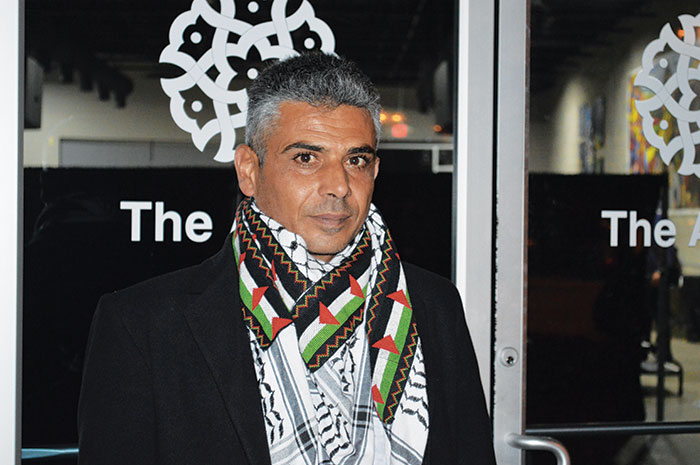
DEARBORN — It was heart-wrenching for Iyad Burnat, an activist from Palestine, to see his son unable to join his friends in playing soccer because of a protest they had chosen to lead.
Recounting the moment his child was shot by Israeli soldiers during a non-violent resistance demonstration in the West Bank farming village of Bil’in, Burnat riled a captivated audience at the Arab American National Museum on Tuesday night.
His first-hand account of being shot and jailed, witnessing crowds of unarmed friends killed, along with women and children protesters beaten, was a manifestation of the message he and other groups have vowed to pursue.
Joining forces with international peace activists, including Israelis, Burnat and his organization, the Bil’in Popular Committee, have held weekly peaceful demonstrations against human rights violations by the Israeli government and the occupation of their land since 2005.
The activist and his brother exposed what would happen during the rallies. They produced an Academy Award-nominated film “Five Broken Cameras” and published the book, “Bil’in and the Nonviolent Resistance” to spread an unfiltered awareness of the struggles Palestinians endure in their homeland.
During his presentation, Burnat expressed confidence in a resolution to the Israeli-Palestinian conflict by promoting education and attention to the atrocities on a grass-roots level.
With the expansion of an Israeli state as a priority its politicians and their allies, Burnat told The AANews that those aligned with the Palestinians doubt the interests of some Arab countries and the American government in diplomatically pushing a one-state democratic solution.
As President-elect Trump vows to seek a solution to the ongoing strife in the Middle East, Burnat said he has little faith in his efforts, as similar promises have been made by previous presidents.
Vice president-elect Mike Pence appeared in a video message in late October, emphasizing American and Israeli ties, referring to Jerusalem as “the eternal, undivided capital of the Jewish people and the Jewish state.”
“Donald Trump and I stand with Israel because Israel’s fight is our fight,” Pence said. “Israel’s cause is our cause. And Israel’s fate is our fate.”
During the campaign, Trump pledged to recognize Jerusalem as Israel’s capital and move the American embassy there from Tel Aviv.
Aside from such political restrictions, Burnat added that pressure from “Zionist lobbies” placed against activists culls progress.
“We believe in the people on the ground to understand,” he said. “With educating people about the truth, you will succeed.”
The United States has spent about $6.2 trillion per year from 1973 until 2000 to support the occupation, according to Burnat. He pointed to the 2 million homeless and 36 million those living under the poverty line in the U.S.
That kind of information about the end use of American dollars to “kill other people” could be effective in organizing the American public to stand against Israeli occupation expansion, he added.
He also said the Bil’in Popular Committee recently struck an unlikely but natural local alliance with the Black Lives Matter movement. Members of that movement visited the Palestinian village and participated in demonstrations after Burnat met with Black Lives Matter leaders in Atlanta. The two movements plan on continuing to fight toward their shared human rights goals.
George Khoury, an organizer at the United States Palestinian Community Network, that helped organize Burnat’s presentation, echoed the activist’s position on the lack of leadership from Arab World leaders toward a solution.
“People never negged on their own rights and their own country,” he said. “But when they saw what happened after the Oslo Agreement, they got discouraged and said, ‘Why work for this kind of set-up?'”
The network works to unify scattered Palestinian organizations to act together on issues that affect them locally and advocates for the interest of Palestinian people abroad.
However, advocacy efforts have not gone unnoticed by American and European activists, who actively engage in effective work abroad.
Pat Ochodnicky, 75, has stood alongside Palestinians for several years. Through the Ecumenical Accompaniment Program in Palestine and Israel, Ochodnicky and teams of volunteers from more than 30 countries spread throughout the West Bank to provide protection to villagers.
She said all that means is there are fewer violent activities when there is an international individual with a camera present.
For example, she would walk children to schools and accompany shepherds.
The most important part of the job, however, is for volunteers to come back to their respective counties and spread awareness of what they have seen through lectures, books and other means.
David Celton, a local Jewish university student and member of Jewish Voice for Peace-Detroit, said he tries to promote honest information about the Israeli-Palestinian conflict within the Jewish community – although it has proven difficult at times.
Brought up as a secular Jew who went to study in Jerusalem, Celton said the idea of an Israeli state being contingent on the religion is instilled in most Israeli Jewish youth.
As he became further involved in his community and made friends in the Israeli military, Celton said he began to recognize that nationalism and obligatory Israeli military service was turning Israel’s youth into “killers.”
Celton said among his peers, an expansion of the Israeli state is a “non-negotiable.”
He added there is ignorance in some Jewish communities that perpetuate the ideas that Palestinians are terrorists.
Just the fact that he showed up to the event at the museum might cause him to lose some friends, he said.
He said many American Jews who view videos exposing Israeli military violence against protestors say, “That can’t be the Israel we are supporting.”
“Until they see the truth, they will live in fantasy propaganda world and pretend it is not going on,” he said.






Leave a Reply